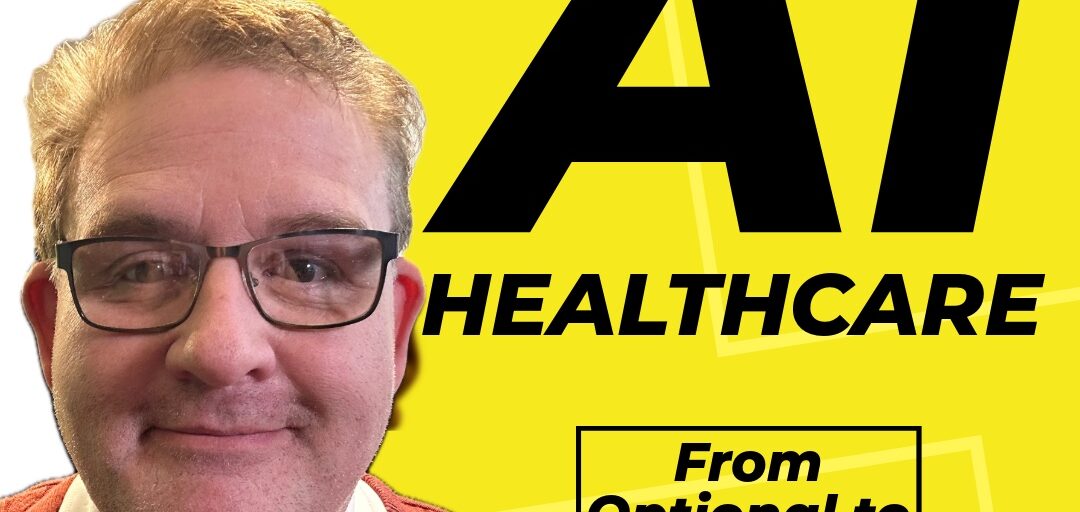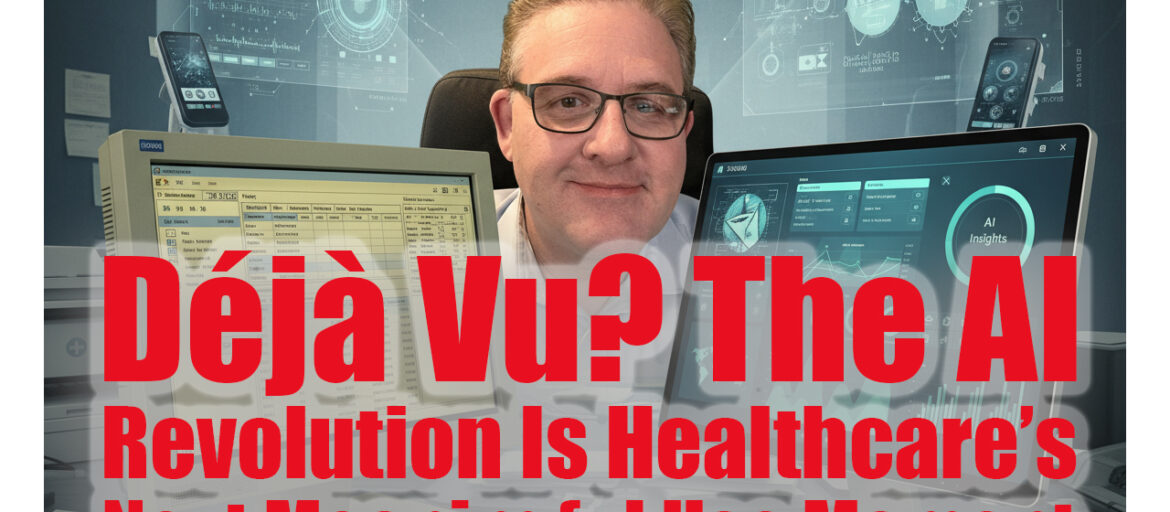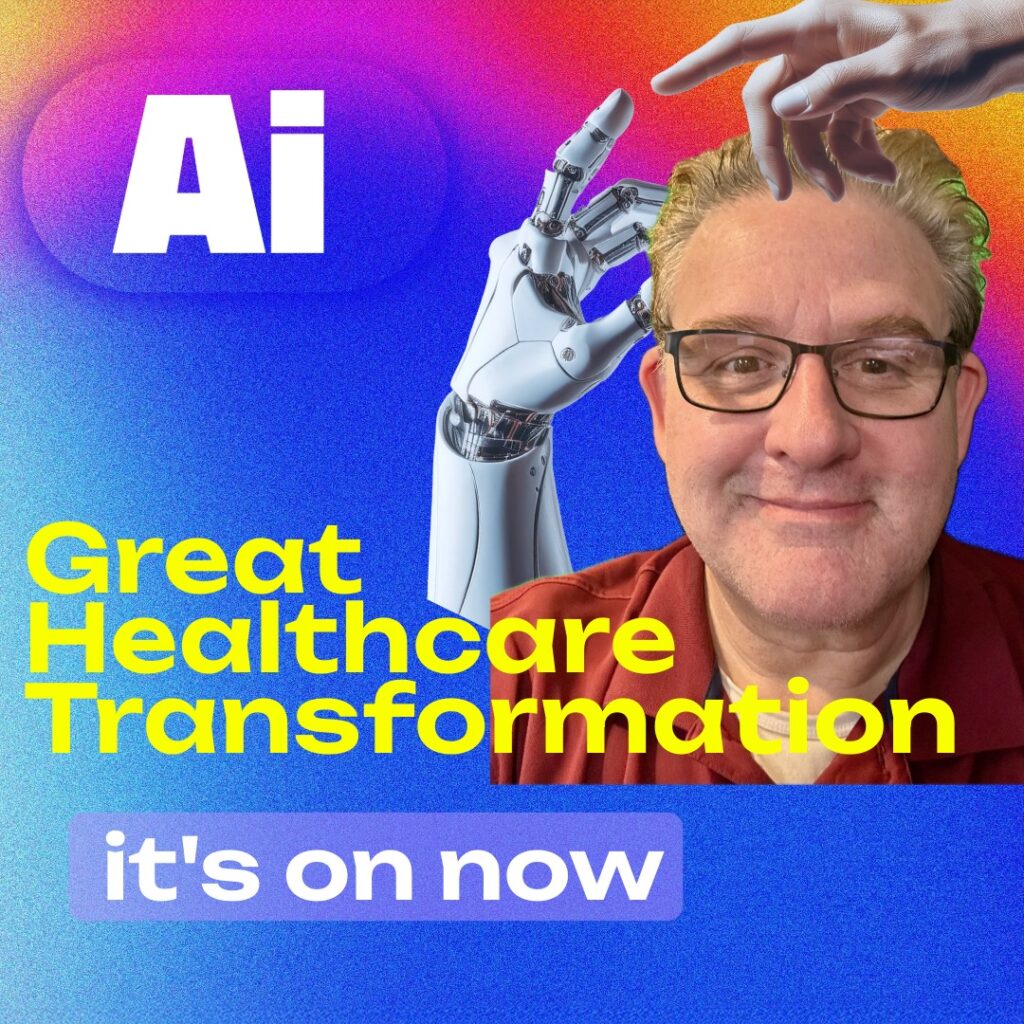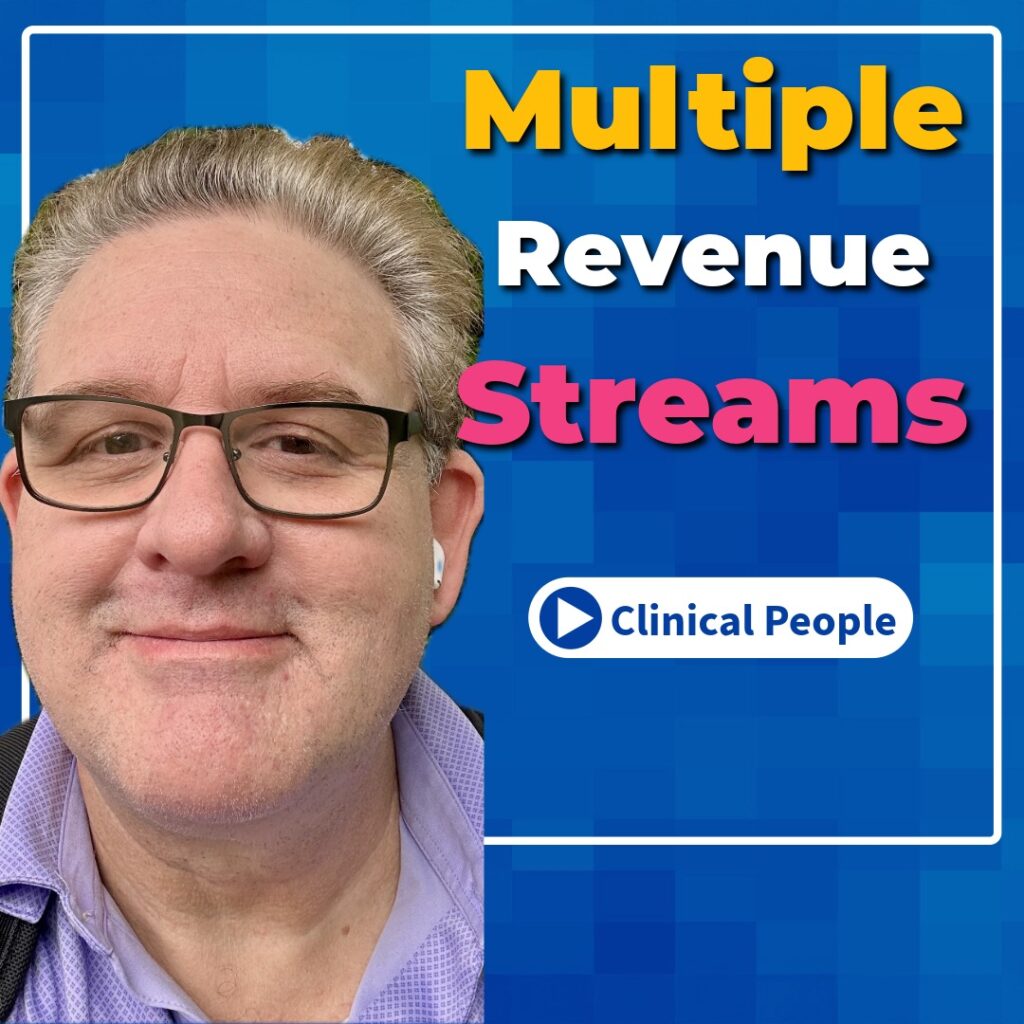Why AI Implementation in Healthcare Will Fail Without Clinical Professionals
Written by Rod on November 3, 2025
I’m watching it happen again, and this time I know exactly how the story ends.
Back in 2008, when electronic patient record (EPR) systems were still optional and most healthcare professionals thought they were just expensive toys that would never replace paper charts, I was already working in digital health. I watched hospitals struggle with implementations that failed spectacularly because technology companies didn’t understand clinical workflows. I saw vendors promise elegant solutions that created chaos when they met real patient care situations. I witnessed the desperate scramble when EPR adoption suddenly became mandatory and organizations realized they needed professionals who understood both clinical needs and digital systems.
That experience turned into the most lucrative phase of my career. Healthcare organizations paid premium rates for clinical professionals who could bridge the gap between what technology promised and what patient care actually required.
Now, in 2025, I’m watching the exact same pattern unfold with artificial intelligence. The technology has rough edges. People think it might be a passing fad. Adoption is currently voluntary. And the biggest resistance comes from clinical staff who are—quite rightly—protecting their patients from potentially dangerous technology deployed by people who don’t understand the clinical context.
Here’s what I know with absolute certainty: AI adoption in healthcare will become mandatory within the next 2-3 years, and when it does, your clinical credibility will be worth more than you can possibly imagine right now.
The Pattern That Predicts Everything
Let me show you the parallels between EPR implementation then and AI implementation now, because understanding this pattern reveals exactly where the opportunities lie:
2008 EPR Landscape: Technology existed but was clunky. Healthcare organizations experimented cautiously. Most clinicians were skeptical. Vendors overpromised and underdelivered. Implementation required understanding both clinical workflows and digital systems.
2025 AI Landscape: Technology exists but has rough edges. Healthcare organizations are experimenting cautiously. Most clinicians are skeptical. Vendors overpromise and underdeliver. Implementation requires understanding both clinical workflows and AI capabilities.
What Happened Next with EPRs: Government mandates made adoption financially necessary. Organizations scrambled for expertise. Clinical professionals with digital health knowledge commanded premium compensation. Global healthcare systems followed the same trajectory. EPRs became standard infrastructure.
What’s Coming Next with AI: Regulatory frameworks will make adoption financially necessary. Organizations will scramble for expertise. Clinical professionals with AI knowledge will command premium compensation. Global healthcare systems are already following the same trajectory. AI will become standard infrastructure.
The script is identical. The timeline is predictable. The opportunity is massive.
Why Tech Companies Need You More Than You Need Them
Here’s the uncomfortable truth that technology companies are discovering: you can’t build effective healthcare AI without clinical credibility, and clinical credibility can’t be faked or purchased.
A Johns Hopkins professor captured this perfectly when discussing the surge of physicians joining tech companies: “We’re seeing a lot of chief medical officers coming on board to grant that clinical, medical legitimacy to whatever products people are developing.”
That word—legitimacy—is everything. Technology companies can hire brilliant programmers. They can recruit data scientists with PhDs. They can secure funding from prestigious venture capital firms. But none of that matters if clinical professionals don’t trust their products, and clinical trust only comes from clinical credibility.
Dr. Nate Favini experienced this firsthand when he transitioned from internal medicine to become Chief Medical Officer at Forward, a digital health startup. In interviews, he emphasizes that his role isn’t about programming AI algorithms—it’s about ensuring that technology “translates to the health impact that we want.” Without his clinical perspective, the technology might be technically impressive but clinically useless or even dangerous.
Tech companies are beginning to understand that the most sophisticated AI in the world fails completely if it doesn’t fit into actual clinical workflows or if it creates safety risks that clinicians immediately recognize.
The Resistance That Proves Your Value
When I work on AI implementation projects, the biggest resistance always comes from clinical staff. Not because they’re technophobic or change-resistant, but because they’re protecting patients and the care environment from technology that might cause harm.
This resistance isn’t a problem to overcome—it’s proof that clinical judgment is the essential ingredient that makes AI implementation safe and effective.
Consider what clinical professionals instinctively evaluate when new technology appears:
Workflow Integration: Does this AI tool fit into how we actually work, or does it create additional steps that reduce efficiency and increase error risk?
Safety Implications: What happens when the AI gets it wrong? Are there appropriate safeguards? Can clinicians override recommendations when clinical judgment demands it?
Patient Impact: Does this technology genuinely improve patient outcomes, or does it just generate impressive metrics that don’t translate to better care?
Trust Factors: Who validated this AI? What data was it trained on? Does it understand the patient populations we serve?
These aren’t obstacles to implementation—they’re the critical questions that prevent dangerous deployments. Technology companies can’t answer these questions credibly because they don’t have the clinical experience to understand what they don’t know.
You have the credibility to ask these questions and the expertise to evaluate the answers. That’s why your involvement in AI implementation isn’t optional—it’s essential.
The Global Mandate That’s Already Building
Just like EPR adoption, AI implementation in healthcare is transitioning from voluntary experimentation to regulatory requirement. The signs are everywhere if you know what to look for:
European Union: The AI Act includes specific healthcare provisions requiring safety oversight and bias monitoring for AI medical devices. Healthcare organizations are preparing for compliance requirements that will make AI governance mandatory.
United Kingdom: NHS England has published guidance for AI-enabled clinical tools and is developing performance metrics that will eventually tie AI adoption to funding formulas—exactly the Meaningful Use playbook that made EPRs mandatory.
United States: The Centers for Medicare & Medicaid Services are exploring AI performance metrics for quality reporting. Insurance companies are beginning to require AI-powered clinical decision support for certain high-risk procedures.
Canada: Health Canada is creating AI medical device regulations that will require healthcare organizations to demonstrate AI safety protocols and clinical validation processes.
Australia: The Therapeutic Goods Administration is developing AI medical device pathways that will standardize AI adoption across healthcare systems.
This isn’t speculation—these are active policy developments happening right now across every major healthcare system. The mandate is coming. The only question is whether you’ll be positioned when it arrives.
The Professionals Who Saw It Coming
Some clinical professionals aren’t waiting for the mandate—they’re positioning themselves now while the opportunity window is wide open.
The £100,000 EPIC nurse role in London represents what happens when organizations realize that clinical expertise combined with technology understanding is worth five to six times standard nursing salaries. That same premium will apply to AI implementation expertise once adoption becomes mandatory.
Dr. Dale Bramley’s appointment as CEO of New Zealand’s Health NZ demonstrates how clinical credibility creates leadership opportunities in digital health transformation. Digital health leaders across New Zealand welcomed his appointment specifically because his medical background ensures that technology decisions serve clinical reality rather than just technical specifications. His organization is implementing AI tools for population health management, and his clinical judgment guides which tools get deployed and how.
Studies during COVID-19 revealed that healthcare organizations with dedicated clinical informatics leaders—nurses and doctors given formal time for digital projects—were far more successful at scaling new technologies than organizations that treated technology as purely an IT concern. These clinical leaders became critical success factors for implementation projects.
The pattern is clear: organizations that involve clinical professionals in technology leadership achieve better outcomes and avoid expensive failures. As AI implementation accelerates, this pattern will intensify.
What Your Clinical Credibility Is Actually Worth
Let me be specific about what AI implementation expertise commands in the current market, because the numbers reveal how desperately healthcare needs clinical professionals who understand both patient care and AI:
AI Implementation Consulting: Clinical professionals with AI expertise charge $200-$350 per hour for implementation guidance. At 40 billable hours per week, that’s $416,000 to $728,000 annually—significantly more than most clinical roles pay.
Chief Medical/Nursing AI Officer Roles: Healthcare organizations and AI companies are creating executive positions specifically for clinical professionals who can guide AI deployment. Compensation typically ranges from $250,000 to $500,000 annually, plus equity.
AI Safety and Governance Advisory: As regulations increase, organizations need clinical professionals who understand both patient safety and AI risks. Advisory roles command $150-$250 per hour plus retainer agreements.
Training and Change Management: When AI becomes mandatory, someone needs to train clinical staff and manage the transition. Clinical professionals who can teach AI adoption earn premium fees because they speak both clinical and technical languages.
These aren’t future projections—these are current market rates for clinical professionals with AI expertise. When adoption becomes mandatory, demand will increase dramatically while supply of qualified professionals remains limited.
The Skills That Matter More Than Programming
Here’s what confuses many clinical professionals about AI opportunities: they assume they need to become programmers or data scientists to participate in the AI revolution.
That’s completely wrong.
The most valuable professionals in AI implementation aren’t those who build algorithms—they’re those who ensure algorithms serve real clinical needs and maintain patient safety. You don’t need to program AI systems any more than you needed to program EPR systems. What you need is:
AI Literacy: Understanding how machine learning works, what natural language processing can do, and where predictive analytics adds value. This is conceptual knowledge, not programming skills.
Workflow Analysis: Identifying where AI can genuinely improve clinical processes versus where it creates additional burden or risk. This requires clinical experience, not technical training.
Safety Evaluation: Recognizing potential failure modes, bias risks, and safety concerns that technical teams might miss. This comes from clinical judgment developed at the bedside.
Implementation Guidance: Helping organizations deploy AI tools in ways that fit actual clinical workflows rather than idealized processes. This requires understanding how healthcare really operates.
Change Leadership: Building trust with clinical staff who are rightfully cautious about AI adoption. This demands clinical credibility that can’t be faked.
Every one of these skills builds directly on your clinical experience. The expertise you’ve already developed becomes more valuable, not less, when applied to AI implementation.
The Window That Won’t Stay Open
Here’s what I learned from the EPR mandate: the biggest opportunities exist during the transition phase, not after universal adoption.
During the voluntary adoption phase (where we are now with AI), early movers can develop expertise, build relationships, and establish reputations before competition intensifies. Organizations implementing AI voluntarily are more willing to invest properly in clinical expertise because they’re focused on success rather than just compliance.
During the mandatory adoption phase (coming 2027-2029), organizations will desperately need AI implementation expertise but will face limited supply and premium prices. This is when clinical professionals with AI knowledge will command extraordinary compensation.
During the universal standard phase (2030+), AI literacy will become expected baseline competency. The premium opportunities will have already been captured by those who positioned early.
The window for positioning yourself as an AI implementation expert is open right now. In 2-3 years, when AI adoption becomes mandatory, organizations will pay whatever it takes to find clinical professionals who understand both patient care and AI capabilities. But the professionals commanding those premium rates will be those who developed expertise during the voluntary phase.
The Protection Instinct That Makes You Essential
The biggest resistance to AI implementation comes from clinical staff who are protecting patients from potentially dangerous technology. This resistance isn’t ignorance or fear of change—it’s the same protective instinct that catches medication errors, questions unsafe orders, and advocates for patients when systems fail them.
This protective instinct is exactly what makes clinical professionals essential to successful AI implementation.
Technology companies need someone who will ask hard questions they don’t know to ask. Healthcare organizations need someone who will identify safety risks before they harm patients. Clinical staff need someone with credibility to guide them through technology changes while ensuring patient protection remains paramount.
You can’t fake the clinical judgment that comes from managing complex patients. You can’t manufacture the trust that clinical staff give someone who’s lived their reality. You can’t shortcut the safety awareness that develops from years of patient care.
When I work with organizations on AI implementation, my clinical credibility is what allows the projects to succeed. Technical teams trust me to translate clinical needs accurately. Clinical staff trust me to protect patient safety. Leadership trusts me to guide decisions that balance innovation with risk management.
That credibility took years to develop at the bedside—and now it’s the foundation for work that impacts thousands of patients instead of the handful I could care for during a single shift.
Your Strategic Position for the AI Mandate
The AI revolution in healthcare is following the exact script as EPR implementation. Government mandates are building. Organizations are experimenting cautiously. Clinical professionals are rightfully skeptical. And the professionals who position themselves now will command premium compensation when adoption becomes mandatory.
You have clinical credibility that technology companies desperately need but can’t purchase or fake. You have the protective instincts that ensure AI implementation serves patient safety rather than just technical objectives. You have the workflow understanding that determines whether AI tools succeed or fail in real clinical environments.
The question isn’t whether AI will become mandatory in healthcare—it will, probably within 2-3 years. The question is whether you’ll position yourself strategically before the mandate creates desperate demand for your expertise.
This is your Meaningful Use moment. This time, you know it’s coming.
If you’re wondering how to translate your clinical expertise into AI implementation capability before the mandate hits, let’s talk about positioning you for the opportunity that’s unfolding right now. The professionals who prepare strategically today will be the ones commanding premium rates tomorrow.
References
[1] European Commission (2024). The AI Act: Healthcare provisions and requirements. https://digital-strategy.ec.europa.eu/en/policies/regulatory-framework-ai
[2] NHS England (2025). Guidance for AI-enabled clinical tools and performance metrics. https://www.england.nhs.uk/ai-in-health-and-care/
[3] Business Insider (2025). Burned-out physicians reinventing careers as CMOs and digital health leaders. https://www.businessinsider.com/burned-out-doctors-reinventing-careers-tech-cmo-roles
[4] HealthManagement.org (2021). Why all healthcare organizations need digital health leaders. https://healthmanagement.org/c/digital/issuearticle/why-all-healthcare-organisations-need-digital-health-leaders
[5] NZ Herald (2025). Dr Dale Bramley named Health NZ chief executive. https://www.nzherald.co.nz/nz/dr-dale-bramley-named-health-nz-chief-executive
[6] Healthcare Financial Management Association (2024). AI in healthcare: Regulatory landscape and future outlook. https://www.hfma.org/topics/news/2024/07/ai-healthcare-regulatory-landscape-future-outlook.html
[7] Health Canada (2025). AI medical device regulations framework. https://www.canada.ca/en/health-canada/services/drugs-health-products/medical-devices/artificial-intelligence-machine-learning.html




